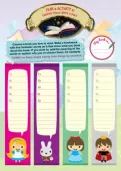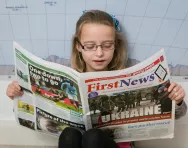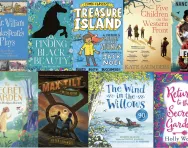Important update from TheSchoolRun
For the past 13 years, TheSchoolRun has been run by a small team of mums working from home, dedicated to providing quality educational resources to primary school parents. Unfortunately, rising supplier costs and falling revenue have made it impossible for us to continue operating, and we’ve had to make the difficult decision to close. The good news: We’ve arranged for another educational provider to take over many of our resources. These will be hosted on a new portal, where the content will be updated and expanded to support your child’s learning.
What this means for subscribers:
- Your subscription is still active, and for now, you can keep using the website as normal — just log in with your usual details to access all our articles and resources*.
- In a few months, all resources will move to the new portal. You’ll continue to have access there until your subscription ends. We’ll send you full details nearer the time.
- As a thank you for your support, we’ll also be sending you 16 primary school eBooks (worth £108.84) to download and keep.
A few changes to be aware of:
- The Learning Journey weekly email has ended, but your child’s plan will still be updated on your dashboard each Monday. Just log in to see the recommended worksheets.
- The 11+ weekly emails have now ended. We sent you all the remaining emails in the series at the end of March — please check your inbox (and spam folder) if you haven’t seen them. You can also follow the full programme here: 11+ Learning Journey.
If you have any questions, please contact us at [email protected]. Thank you for being part of our journey it’s been a privilege to support your family’s learning.
*If you need to reset your password, it will still work as usual. Please check your spam folder if the reset email doesn’t appear in your inbox.
Expanding your child’s reading tastes

Most children go through a phase where they’re only interested in reading one style of book – or even one series or author. Whether they’re obsessed with spy stories, permanently absorbed in Rainbow Magic, or will only read books by JK Rowling, it’s natural as a parent to be concerned that their narrow reading tastes are limiting their learning.


Claim A FREE Book Reviews Activity Pack!
- A huge collection of creative writing & reading comprehension resources
- Explore texts, deepen understanding, share opinions
- For Year 1 to Year 6
So how can we encourage our children to broaden their reading horizons without putting them off altogether?
Why do children get stuck in a reading rut?
Although it can be frustrating to see your child picking the same type of book over and over again, it’s a normal part of childhood. ‘There are so many huge series that go on forever, and they don’t have the experience to know that there are lots of other things out there that they might enjoy just as much,’ says Tricia Adams, director of the School Library Association.
Probably the main reason why children tend to gravitate to a particular series, genre or author is because they enjoy the subject matter. But the fact that they’re still developing their reading skills also plays a part. Sticking to what they know means they can read purely for pleasure, without the challenge of tackling words or plots that they might not have encountered before.
‘Reading something they feel comfortable with gives children the confidence to keep going and know they can do it,’ explains Tricia. ‘On the other hand, forcing them to read something different that is too difficult can be discouraging.’
Why reading widely matters
Any reading is good reading, and there’s nothing intrinsically bad about your child sticking to what they know and like. But there are clear advantages in expanding their reading tastes to include books that may be outside their comfort zone.
‘Broad reading has a big impact academically,’ Tricia says. ‘The more widely a child reads, the greater the range of vocabulary, grammar, syntax, plot and genre they will explore. This will all have an impact not just on their reading comprehension, but also on the quality of their writing.’
Reading widely also helps them tap into the knowledge demanded by the National Curriculum. Children are required to become familiar with a range of styles – including fairy tales, traditional tales, poems and rhyme – as early as Year 1. By KS2, they’re expected to read and discuss genres including fiction, non-fiction, poetry, plays and reference books.
The more widely your child reads, the more indirect life experience they’ll gain, too. ‘Reading is all about walking a mile in someone else’s shoes,’ Tricia explains. ‘Children gain experiences that they’d never have in normal life, just by being lost in someone else’s world.’
Helping your child broaden their tastes
While there’s nothing wrong with your child reading their old favourites, coaxing them to try reading something different is never a bad thing. So how do you actually do it?
Take them to the library Letting them browse the shelves by themselves and picking something that appeals to them, without any influence from you, is one of the best things you can do for your child. ‘Be there as a guide, but don’t interfere by telling your child that a book is too young, too old, or not right for them,’ Tricia says.
Talk to the librarian Children’s librarians usually have an extensive knowledge of the books that have been published recently as well as modern classics and old favourites. They can suggest titles that will gently stretch your child beyond their comfort zone, based on what they currently like reading.
Join a book club ‘Talking about books is a wonderful skill to develop, and often, all it takes is a friend to say, “Have you read this book?” to encourage a child to try something different,’ Tricia explains.Some schools and public libraries run book clubs for kids that meet in person, like the Reading Agency’s Chatterbooks.
Take part in a reading challenge Every year, the National Literacy Trust runs its Premier League Reading Stars campaign through schools and libraries. Aimed at reluctant or low-achieving readers, it enlists football players to inspire children to read more widely, with rewards as they progress.
The Reading Agency also runs an annual Summer Reading Challenge through public libraries. Children are rewarded for borrowing and reading six (or more) books from the library over the school holidays, with stickers and certificates.
Use audio books If you think your child is limiting their reading material to what they feel safe and confident with, audio books can help to extend them. Listening to a story read aloud gives them the chance to enjoy books that they wouldn’t normally pick up, and helps them follow storylines and structures that may be too complex in printed form.
Read aloud As with audio books, reading aloud to your child means they can enjoy books and genres that they might not feel comfortable reading independently. Poetry, for example Michael Rosen’s poems for kids, can be far more engaging when you read it aloud than when your child is left to read it by themselves.
Take out a subscription Kids love getting post, so taking out a subscription to an educational magazine or newspaper is a great way to encourage them to start to read non-fiction for pleasure. There are also subscription services like Reading Chest, where you borrow books, pitched at the right level for your child, which are delivered by post.
Go to a book swap Schools, libraries and youth groups sometimes hold book swaps where each child brings along a book that they’ve read and enjoyed and can exchange it for another title. ‘I’ve seen some schools wrap all the books in brown paper or gift wrap, which means every child is likely to take home a book that they’d never normally have picked up,’ Tricia says.
Be open-minded ‘Often, parents unintentionally discourage children from reading more widely by being a bit snobby about their choice of reading matter,’ explains Tricia. Comics, for example, may not be highbrow literature, but if your child is reading one as an alternative to their usual staple diet of Horrid Henry, embrace it!
Don’t be pushy Although it can be exasperating to see your child stuck firmly in a reading rut, resist the urge to force them to try something different: it may be successful short-term, but there’s a danger that it’ll take the enjoyment out of reading and put them off completely.
‘Reading narrowly is a phase that your child will outgrow,’ Tricia adds. ‘Eventually they’ll run out of books in a series or start to get bored, and at that point, they’ll discover something new for themselves.’








